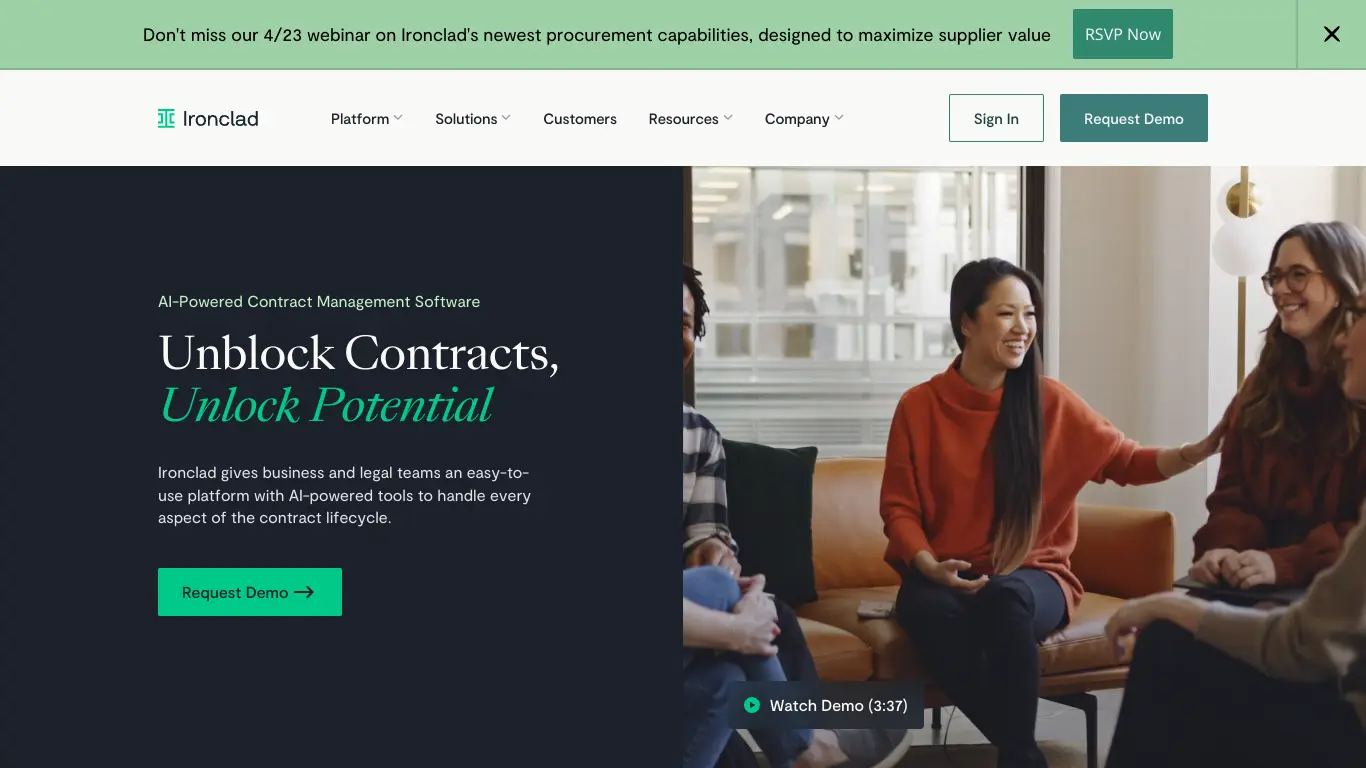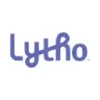Ironclad transforms contract management with AI-powered workflows, enabling faster creation, execution, and analysis for legal teams.
Introduction to Ironclad
Have you ever spent countless hours negotiating contracts, only to face bottlenecks in the approval process? Or perhaps you’ve struggled with finding specific clauses in your company’s vast repository of legal documents? Contract management remains one of the most time-consuming and error-prone aspects of business operations, with legal teams often becoming overwhelmed by repetitive tasks that could be automated. This is where Ironclad steps in – a revolutionary solution that’s transforming how businesses handle their contracts from creation to execution.
What is Ironclad and its Purpose?
Ironclad is a digital contracting platform that streamlines the entire contract lifecycle from drafting to signing, storing, and analyzing. Unlike traditional contract management systems that simply store documents, Ironclad leverages artificial intelligence to create a truly intelligent contract management experience.
The platform was designed with a clear purpose: to free legal teams from mundane administrative tasks so they can focus on high-value strategic work. By automating workflows, simplifying approvals, and providing powerful analytics, Ironclad transforms contracts from static documents into dynamic assets that drive business value.
At its core, Ironclad serves as a centralized hub where all stakeholders—legal teams, business users, and counterparties—can collaborate effectively throughout the contracting process. The platform integrates with existing tools like Salesforce, DocuSign, and Microsoft Word to create a seamless experience that doesn’t disrupt established workflows.
Who is Ironclad Designed For?
Ironclad caters to organizations of all sizes, from growing startups to Fortune 500 companies. However, it particularly shines in environments where:
- Legal teams are overwhelmed with contract requests
- Business teams need to self-serve on routine contracts
- Organizations need better visibility into their contractual obligations
- Companies want to accelerate deal closures without compromising compliance
The platform has proven especially valuable for:
- In-house legal departments seeking to streamline operations and provide faster service to internal clients
- Sales teams looking to accelerate deal cycles and reduce friction in the contract process
- Procurement professionals managing complex supplier agreements and terms
- HR departments handling employment contracts and onboarding documents
- Compliance officers needing better oversight of contractual obligations
Ironclad’s client roster includes innovative companies like L’Oréal, Mastercard, Dropbox, and Lyft, demonstrating its versatility across industries.
Getting Started with Ironclad: How to Use It
Getting started with Ironclad follows a structured onboarding process designed to ensure successful implementation:
- Discovery and Planning: The Ironclad team works with you to understand your current contracting processes, pain points, and objectives.
- Implementation: Your most common contract types and workflows are configured in the system, with integrations set up for your existing tools.
- Training: Both admins and end-users receive comprehensive training to ensure adoption across the organization.
- Go-Live: The platform is launched, with the Ironclad team providing support during the transition.
- Continuous Optimization: Regular check-ins help identify opportunities for further automation and process improvement.
The platform’s intuitive interface makes it accessible for users of all technical abilities. Business teams can initiate contracts through user-friendly forms, while legal teams benefit from powerful template management and clause libraries. Approvers receive automated notifications when their input is needed, and signatories can execute documents electronically through integrated e-signature capabilities.
Ironclad’s Key Features and Benefits
Core Functionalities of Ironclad
Ironclad offers a comprehensive suite of features that cover the entire contract lifecycle:
1. Workflow Designer
Create custom workflows for different contract types with conditional logic, approval routing, and automated notifications. This visual tool requires no coding and allows legal teams to design processes that match their specific requirements.
2. Repository and Search
Store all contracts in a centralized, searchable repository with AI-powered search capabilities that can find specific clauses and terms across thousands of documents in seconds.
3. Template Management
Maintain a library of pre-approved templates with conditional logic that adapts to different scenarios, reducing the need for legal review of standard agreements.
4. Clickwrap Management
Create, deploy, and track online agreements such as terms of service and privacy policies, with comprehensive audit trails for compliance purposes.
5. Data Extraction
Extract key metadata from contracts using AI, making it easy to track obligations, renewal dates, and other critical information.
6. Analytics Dashboard
Gain insights into contracting metrics such as cycle times, bottlenecks, and high-volume requesters to continuously improve processes.
7. Collaborative Editor
Negotiate and redline documents directly within the platform, with version control and comparison features that track changes across multiple rounds.
8. Digital Signatures
Execute agreements electronically with built-in e-signature functionality or integrations with popular services like DocuSign.
Advantages of Using Ironclad
Organizations implementing Ironclad typically experience significant benefits across multiple dimensions:
🚀 Efficiency Gains
- 75% faster contract creation through self-service workflows
- 85% reduction in contract processing time with automated routing and approvals
- 90% decrease in contract errors through standardized templates
💰 Cost Savings
- Reduced legal spend on routine contracts
- Lower risk of costly contractual errors
- Decreased administrative overhead
⚖️ Risk Mitigation
- Improved compliance with standardized terms
- Comprehensive audit trails for regulatory purposes
- Better visibility into contractual obligations
🤝 Enhanced Collaboration
- Streamlined negotiation process with counterparties
- Improved communication between legal and business teams
- Greater transparency across all stakeholders
📊 Strategic Insights
- Data-driven decision making on contract terms and process improvements
- Better forecasting based on contract renewal data
- Identification of optimization opportunities in contracting processes
Main Use Cases and Applications
Ironclad’s versatility allows it to address numerous contracting scenarios:
Sales Agreements
Accelerate revenue by streamlining the creation and execution of sales contracts, with CRM integration for a seamless experience from opportunity to signed agreement.
Procurement Contracts
Standardize vendor agreements while maintaining flexibility for negotiated terms, with advanced tracking of supplier obligations and performance metrics.
NDAs and Routine Agreements
Enable business users to self-serve on standard non-disclosure agreements and other routine contracts without legal intervention, using pre-approved templates with guardrails.
Employment Documents
Streamline the creation and management of offer letters, employment agreements, and other HR documentation with automated workflows that integrate with HRIS systems.
Complex Negotiations
Facilitate multi-party contracts with sophisticated approval flows, redlining capabilities, and audit trails that document the evolution of terms throughout the negotiation process.
Contract Amendments and Renewals
Proactively manage contract lifecycles with automated alerts for upcoming renewals, streamlined amendment processes, and historical version comparison.
Exploring Ironclad’s Platform and Interface
User Interface and User Experience
Ironclad’s interface reflects its mission to make contracting accessible to all stakeholders, not just legal professionals. The platform strikes a delicate balance between simplicity for everyday users and powerful functionality for advanced administrators.
Dashboard
Upon logging in, users are greeted with a personalized dashboard displaying:
- Contracts awaiting their action
- Recently accessed documents
- Key metrics relevant to their role
- Announcements and system updates
The clean, intuitive layout uses visual cues to guide users toward their next actions, minimizing the learning curve for new adopters.
Workflow Experience
Initiating a contract follows a guided, form-based approach where:
- Users select the appropriate contract type
- Dynamic forms collect necessary information
- The system automatically generates the document
- Approval routing happens behind the scenes
This structured process ensures compliance while remaining user-friendly—a significant improvement over email-based workflows that lack visibility and control.
Negotiation Interface
The collaborative editor provides a Microsoft Word-like experience for redlining and negotiation, with key improvements:
- Side-by-side comparison of versions
- Comment threading for contextual discussions
- Acceptance/rejection tracking
- Term suggestion based on historical agreements
Administrator Controls
For legal and system administrators, Ironclad offers robust configuration options without requiring technical expertise:
- Drag-and-drop workflow builder
- Visual template editor with conditional logic
- Permission management
- Custom field creation
- Integration configuration
The thoughtful design of these interfaces reflects Ironclad’s understanding that contract automation succeeds only when it’s widely adopted across the organization.
Platform Accessibility
Ironclad prioritizes accessibility to ensure the platform serves diverse organizational needs:
Multi-device Support
The responsive design works seamlessly across:
- Desktop computers
- Tablets
- Mobile devices
This flexibility allows approvers to keep processes moving even when away from their desks.
Browser Compatibility
Ironclad functions in all major browsers including:
- Google Chrome
- Mozilla Firefox
- Microsoft Edge
- Safari
Integration Ecosystem
The platform offers deep integrations with:
| Category | Integrations |
|---|---|
| CRM | Salesforce, HubSpot |
| Document Management | SharePoint, Box, Google Drive |
| E-Signature | DocuSign, Adobe Sign, native e-signature |
| Communication | Slack, Microsoft Teams |
| HRIS | Workday, BambooHR |
| Finance | NetSuite, QuickBooks |
These integrations allow Ironclad to fit naturally into existing technology ecosystems rather than forcing users to adopt yet another siloed tool.
API Access
For organizations with unique requirements, Ironclad provides a robust API that allows for custom integrations and extensions of the platform’s capabilities.
Security and Compliance
The platform meets enterprise security standards with:
- SOC 2 Type II compliance
- GDPR readiness
- Role-based access controls
- Comprehensive audit logs
- Data encryption at rest and in transit
These measures ensure that sensitive contract information remains protected while remaining accessible to authorized users.
Ironclad Pricing and Plans
Subscription Options
Ironclad offers tiered subscription plans designed to accommodate organizations at different stages of contract management maturity. While the company doesn’t publish specific pricing on its website (preferring to create custom quotes based on each organization’s needs), the general structure includes:
Essentials Plan
- Designed for smaller legal teams and organizations new to contract automation
- Includes core document generation and workflow capabilities
- Limited number of templates and contract types
- Basic repository and search functionality
- Standard reporting
Professional Plan
- Aimed at mid-sized organizations with more complex contracting needs
- Expanded template library and workflow capabilities
- Enhanced analytics and reporting
- API access for custom integrations
- Advanced search functionality
- Higher document volume capacity
Enterprise Plan
- Designed for large organizations with sophisticated contracting requirements
- Unlimited documents and templates
- Full suite of AI capabilities
- Dedicated customer success manager
- Custom integrations
- Advanced security features
- Multi-entity support
- Global deployment options
All plans include implementation support, though the level of assistance increases with higher tiers. Enterprise customers typically receive white-glove implementation services with dedicated project managers to ensure successful adoption.
Pricing factors that influence the final cost include:
- Number of users
- Contract volume
- Required integrations
- Implementation complexity
- Multi-year commitment discounts
Organizations interested in Ironclad typically engage in a discovery process with the sales team to determine the most appropriate plan for their specific needs.
Free vs. Paid Features
Ironclad doesn’t offer a permanent free tier, but the company does provide several ways to experience the platform before committing to a paid subscription:
Demo Environment
Prospective customers can access a sandbox environment populated with sample data to experience the interface and workflow capabilities firsthand.
Free Trial Period
Some organizations may qualify for a limited-duration free trial of the platform, allowing them to test it with their own contracts and processes.
ROI Assessment
Ironclad offers a complementary ROI assessment where their team analyzes your current contracting processes and demonstrates potential efficiency gains through automation.
The transition from evaluation to paid subscription is designed to be seamless, with configuration work done during the trial period carrying over to the production environment.
Ironclad Reviews and User Feedback
Pros and Cons of Ironclad
Based on analysis of user reviews across G2, Capterra, TrustRadius, and other review platforms, Ironclad’s strengths and limitations emerge:
Pros:
✅ Intuitive User Experience
Users consistently praise the platform’s ease of use, particularly for business teams with limited legal background. The guided workflows and form-based approach make contract creation accessible to everyone.
✅ Powerful Workflow Automation
The ability to design custom workflows with conditional logic receives high marks, with users noting significant time savings and reduction in bottlenecks.
✅ Responsive Customer Support
Many reviews highlight the exceptional quality of Ironclad’s customer success team, with users appreciating the ongoing support and responsiveness to feature requests.
✅ Continuous Innovation
The platform’s regular release of new features and improvements demonstrates Ironclad’s commitment to evolving with customer needs.
✅ Integration Capabilities
Users value how seamlessly Ironclad connects with existing systems, particularly CRM platforms and e-signature tools.
Cons:
❌ Implementation Complexity
Some users note that the initial setup and configuration can be time-consuming, requiring significant input from legal teams to properly design workflows and templates.
❌ Learning Curve for Advanced Features
While basic functions are intuitive, power users mention that mastering the more sophisticated capabilities requires investment in training and practice.
❌ Premium Pricing
Several reviews mention that Ironclad represents a significant investment compared to simpler contract tools, though most acknowledge the ROI justifies the cost.
❌ Mobile Experience Limitations
A few users indicate that while the mobile interface works, it doesn’t offer the full functionality of the desktop experience.
❌ Reporting Customization
Some advanced users wish for more customizable reporting and analytics capabilities, though this appears to be an area of active development.
User Testimonials and Opinions
Real feedback from Ironclad users highlights the platform’s impact across different organizational contexts:
“Ironclad has transformed our legal department from a bottleneck to a business enabler. What used to take weeks now happens in hours, and our business teams can self-serve on routine contracts without legal intervention. The ROI has been incredible.”
— Legal Operations Director, Technology Sector
“The implementation was more involved than we initially expected, but the Ironclad team provided exceptional support throughout the process. Now that we’re up and running, we’ve seen our contract cycle times decrease by over 60%.”
— General Counsel, Healthcare Organization
“As a scaling startup, we needed a solution that could grow with us. Ironclad provided the structure we needed while remaining flexible enough to adapt to our evolving requirements. The analytics have been particularly valuable in identifying process improvements.”
— VP of Legal, E-commerce Company
“The repository functionality alone has been worth the investment. Being able to search across thousands of contracts and instantly find specific clauses has transformed how we approach contract analysis and risk assessment.”
— Compliance Officer, Financial Services Firm
Average ratings across major review platforms position Ironclad as a leader in the contract lifecycle management category:
- G2: 4.7/5 (based on 120+ reviews)
- Capterra: 4.6/5 (based on 90+ reviews)
- TrustRadius: 9.0/10 (based on 40+ reviews)
Ironclad Company and Background Information
About the Company Behind Ironclad
Ironclad was founded in 2014 by Jason Boehmig, a former corporate attorney at Fenwick & West, and Cai GoGwilt, previously a software engineer at Palantir. Their complementary backgrounds in law and technology created the perfect foundation for addressing the inefficiencies they had observed in traditional contract processes.
The company’s origin story reflects a classic entrepreneurial journey: Boehmig had witnessed firsthand how manual contract processes created bottlenecks for businesses, while GoGwilt brought the technical expertise to envision how modern software could solve these problems. Together, they set out to create a platform that would transform contracts from static documents into strategic assets.
Headquartered in San Francisco, Ironclad has grown significantly since its founding:
Funding and Growth
Ironclad has secured over $333 million in funding across multiple rounds, with investors including Accel, Sequoia Capital, Y Combinator, and Bond. Its most recent funding round in early 2021 valued the company at $3.2 billion, establishing it as a unicorn in the legal technology space.
Team
The company has expanded from its two founders to a team of over 300 employees spanning product development, customer success, sales, marketing, and operations. Notably, Ironclad has attracted talent from both the legal and technology sectors, creating a culture that truly understands both domains.
Leadership
Under the continued leadership of CEO Jason Boehmig, Ironclad has assembled an impressive executive team including:
- Cai GoGwilt, CTO and co-founder
- Leyla Seka, COO (formerly EVP at Salesforce)
- Helen Wang, CFO
- Steven Yan, Chief Customer Officer
Company Mission
Ironclad’s mission extends beyond simply digitizing contracts; the company aims to fundamentally transform how businesses create, execute, and derive value from their agreements. This vision has expanded to include using contract data to drive business intelligence and strategic decision-making.
Industry Recognition
The company has received numerous accolades, including:
- Named to the Forbes Cloud 100 list
- Recognized as a Leader in the Gartner Magic Quadrant for Contract Lifecycle Management
- Featured in Fast Company’s Most Innovative Companies list
- Winner of Legaltech Breakthrough Awards for Contract Management Innovation
Ironclad’s growth trajectory illustrates the substantial market demand for intelligent contract solutions that bridge the gap between legal and business operations.
Ironclad Alternatives and Competitors
Top Ironclad Alternatives in the Market
The contract lifecycle management (CLM) space has become increasingly competitive as organizations recognize the strategic importance of efficient contracting. Several notable alternatives to Ironclad include:
1. DocuSign CLM (https://www.docusign.com/products/clm)
DocuSign leveraged its e-signature dominance to build a comprehensive CLM solution. It offers strong document generation, workflow, and repository capabilities with the advantage of seamless integration with its industry-leading signature platform.
2. Conga Contracts (https://conga.com/products/contract-lifecycle-management)
Particularly strong for Salesforce users, Conga Contracts offers robust document generation and workflow management. Its deep integration with the Salesforce ecosystem makes it attractive for organizations heavily invested in that platform.
3. ContractWorks (https://www.contractworks.com/)
Positioned as a more accessible option for smaller organizations, ContractWorks focuses on simplicity and affordability while still offering core repository, tracking, and reporting functionality.
4. Agiloft (https://www.agiloft.com/solutions/contract-management-software/)
Known for its flexibility and customization capabilities, Agiloft offers a highly adaptable CLM solution that can be tailored to specific industry needs and unique processes.
5. LinkSquares (https://linksquares.com/)
With a strong emphasis on AI-powered contract analysis, LinkSquares focuses on helping organizations extract insights from their existing contracts and streamline the creation of new agreements.
6. Juro (https://juro.com/)
Taking a design-centric approach, Juro offers a visually appealing and user-friendly platform focused on making contracts more accessible to business teams.
7. PandaDoc (https://www.pandadoc.com/contract-management-software/)
Targeting sales teams primarily, PandaDoc combines document creation, e-signature, and basic contract management capabilities in an accessible package.
Ironclad vs. Competitors: A Comparative Analysis
When evaluating Ironclad against alternatives, several key differentiators emerge:
| Feature Area | Ironclad | Competitors |
|---|---|---|
| User Experience | Designed for both legal and business users with intuitive interfaces | Varies widely; some prioritize legal users, others focus on specific departments |
| AI Capabilities | Advanced AI for data extraction, clause analysis, and risk assessment | Ranges from basic OCR to sophisticated machine learning; generally less advanced than Ironclad |
| Workflow Flexibility | Highly configurable workflows with visual designer and complex conditional logic | Often more rigid or requires technical expertise to customize |
| Integration Ecosystem | Extensive native integrations across CRM, HRIS, and document management systems | Integration depth varies significantly; some require third-party connectors |
| Repository Functionality | Powerful search with clause-level indexing and metadata filtering | Basic document storage to advanced repositories with varying search capabilities |
| Implementation Support | White-glove implementation with dedicated success managers | Ranges from self-service to consultant-led implementations |
| Pricing Model | Premium pricing reflecting enterprise capabilities | Wide range from budget-friendly options to enterprise solutions |
Key Differentiating Factors
- Business User Focus
While many CLM solutions cater primarily to legal teams, Ironclad distinguishes itself with interfaces specifically designed for business users, driving higher adoption rates across organizations. - Workflow Designer
Ironclad’s visual workflow builder offers unparalleled flexibility without requiring coding or technical expertise, a significant advantage over systems with more rigid processes. - AI Sophistication
The depth of Ironclad’s AI capabilities for contract analysis, risk assessment, and data extraction generally exceeds what competitors offer, particularly for companies with large contract volumes. - Unified Platform
Unlike solutions that have grown through acquisition (leading to disjointed experiences), Ironclad was built from the ground up as a unified platform, creating a more coherent user experience. - Implementation Approach
Ironclad’s customer success methodology is frequently cited as superior to competitors, with a focus on driving adoption and measuring ROI rather than simply deploying technology.
The optimal choice between Ironclad and alternatives ultimately depends on organization-specific factors including:
- Contract volume and complexity
- Industry-specific requirements
- Existing technology ecosystem
- Available budget
- Internal technical resources
- Primary user groups (legal vs. business teams)
Ironclad Website Traffic and Analytics
Website Visit Over Time
Ironclad’s web presence has shown consistent growth over recent years, reflecting increasing interest in contract lifecycle management solutions. According to SimilarWeb and other analytics platforms, ironcladapp.com attracts approximately 120,000-150,000 monthly visitors, with notable traffic spikes coinciding with product launches, funding announcements, and industry events.
The traffic pattern demonstrates seasonal variation typical of B2B SaaS companies, with slight dips during summer months and December holidays, counterbalanced by stronger performance during Q1 and Q4 when many organizations evaluate technology investments.
Year-over-year growth in site traffic has averaged 30-40%, indicative of expanding market awareness and the growing priority of contract management for organizations across industries.
Geographical Distribution of Users
Ironclad’s visitor demographics reflect its global presence while showing concentration in key markets:
Top Countries by Traffic
- 🇺🇸 United States (65%)
- 🇬🇧 United Kingdom (8%)
- 🇨🇦 Canada (6%)
- 🇦🇺 Australia (4%)
- 🇩🇪 Germany (3%)
- 🇫🇷 France (2%)
- 🇮🇳 India (2%)
- Other countries (10%)
Within the United States, traffic concentrates in technology and financial hubs including:
- San Francisco Bay Area
- New York metropolitan area
- Chicago
- Boston
- Los Angeles
- Seattle
This distribution aligns with Ironclad’s customer base, which includes significant representation from technology companies, financial services, healthcare, and manufacturing sectors.
Main Traffic Sources
Analysis of Ironclad’s traffic sources reveals a well-balanced acquisition strategy:
Traffic Source Breakdown
- Organic Search (45%): Demonstrates strong SEO performance for contract management and related terms
- Direct Traffic (25%): Indicates brand recognition and dedicated visitors
- Referral Traffic (15%): Includes industry publications, partner websites, and technology review platforms
- Paid Search (8%): Strategic campaigns targeting high-intent keywords
- Social Media (5%): LinkedIn dominates as the primary social referrer
- Email Marketing (2%): Primarily newsletter subscribers and nurture campaigns
The significant organic search component indicates effective content marketing and SEO strategies, with the site ranking well for terms like “contract management software,” “digital contracting platform,” and “legal workflow automation.”
Noteworthy referring domains include legal technology publications, contract management resource sites, review platforms like G2 and Capterra, and integration partners that mention Ironclad in their marketplace listings.
Frequently Asked Questions about Ironclad (FAQs)
General Questions about Ironclad
What is Ironclad used for?
Ironclad is a digital contracting platform that streamlines the entire contract lifecycle from creation to execution and analysis. It’s used to automate routine contracts, standardize workflows, centralize contract storage, and extract valuable insights from agreement data.
Is Ironclad suitable for small businesses?
While Ironclad offers solutions for organizations of various sizes, its full platform may be most cost-effective for mid-sized to enterprise companies with significant contract volumes. Smaller businesses might find the investment substantial unless they have particularly complex contracting needs or high-value agreements where efficiency gains would justify the cost.
How long does it take to implement Ironclad?
Implementation timelines vary based on complexity, but typical deployments range from 4-12 weeks. Simple implementations with a limited number of contract types might be completed in as little as one month, while enterprise-wide deployments with multiple integrations and complex workflows could take several months.
Does Ironclad work with international contracts?
Yes, Ironclad supports international contracting needs with multi-language capabilities, region-specific templates, and compliance with international e-signature regulations. The platform can accommodate different currencies, date formats, and legal requirements across jurisdictions.
Feature Specific Questions
Can Ironclad integrate with our existing systems?
Ironclad offers pre-built integrations with popular business systems including Salesforce, DocuSign, Microsoft 365, Google Workspace, Slack, and many others. For systems without native integrations, Ironclad provides an API that allows for custom connections to be developed.
How does Ironclad handle contract approvals?
The platform offers flexible approval workflows that can be configured to match your organization’s processes. These can include sequential approvals, parallel approvals, conditional routing based on contract values or terms, delegate capabilities, and automated reminders to prevent bottlenecks.
Can Ironclad assist with contract negotiations?
Yes, Ironclad includes collaborative redlining capabilities that allow both internal teams and external counterparties to negotiate within the platform. Changes are tracked with version control, and comparison tools make it easy to identify modifications across drafts.
What reporting capabilities does Ironclad offer?
The analytics dashboard provides insights into metrics such as cycle time, approval bottlenecks, high-volume requesters, and commonly negotiated terms. Custom reports can be created to track specific KPIs, and data can be exported for further analysis in business intelligence tools.
Pricing and Subscription FAQs
How much does Ironclad cost?
Ironclad doesn’t publish standard pricing as costs are tailored to each organization’s specific needs. Factors affecting pricing include the number of users, contract volume, required features, implementation complexity, and term length. Organizations typically engage with the sales team for a custom quote.
Does Ironclad offer a free trial?
Ironclad typically doesn’t offer a standard free trial but provides demos and sandbox environments where prospective customers can experience the platform. In some cases, limited trials might be arranged for specific use cases during the evaluation process.
What’s included in the subscription cost?
Subscriptions generally include platform access, ongoing support, regular updates, and a certain allocation of storage and user licenses. Implementation services, premium support, and custom development work may involve additional costs depending on the selected plan.
Can we add users or features later?
Yes, Ironclad subscriptions are designed to scale with your needs. Additional users, features, or contract types can be added to your plan as your requirements evolve. Many customers start with a focused implementation and expand usage across departments over time.
Support and Help FAQs
What training resources are available?
Ironclad provides comprehensive training resources including:
- Live training sessions for administrators and end users
- On-demand video tutorials
- Detailed documentation
- Regular webinars on advanced features
- User community for peer learning
How does Ironclad support its customers?
Support options vary by plan but typically include:
- Email and chat support
- Knowledge base access
- Regular check-ins with customer success managers (for higher-tier plans)
- Technical support for integrations and configurations
- User community access
Who handles implementation?
Ironclad provides professional implementation services led by specialists with both legal and technical expertise. The implementation team works closely with your stakeholders to understand requirements, configure workflows, build templates, and ensure successful adoption.
Can we make changes to workflows after implementation?
Yes, Ironclad is designed to be maintained by business users without requiring technical expertise. Administrators can modify workflows, create new templates, and adjust settings as your processes evolve, without depending on IT or vendor assistance for most changes.
Conclusion: Is Ironclad Worth It?
Summary of Ironclad’s Strengths and Weaknesses
After comprehensive analysis of Ironclad’s capabilities, user feedback, and market position, a clear picture emerges of where the platform excels and where potential limitations exist.
Key Strengths:
- Unified End-to-End Platform
Ironclad provides a truly comprehensive solution covering every aspect of the contract lifecycle without cobbling together disparate tools. This creates a seamless experience from request to renewal. - Business-User Accessibility
The platform’s intuitive interface democratizes contracting by making it accessible to non-legal users while maintaining necessary controls and compliance guardrails. - AI-Powered Intelligence
Ironclad’s AI capabilities for data extraction, analysis, and insight generation are among the most sophisticated in the market, transforming contracts from static documents into strategic assets. - Workflow Flexibility
The visual workflow designer enables unprecedented customization without technical expertise, allowing legal teams to automate complex processes that accurately reflect their unique requirements. - Strong Implementation Methodology
Ironclad’s customer success approach focuses on adoption and value realization rather than just technical deployment, resulting in higher ROI and user satisfaction.
Potential Weaknesses:
- Investment Required
The platform represents a significant investment that may be challenging to justify for smaller organizations or those with limited contract volumes. - Implementation Complexity
Realizing the full potential of Ironclad requires thoughtful implementation and process design, creating a steeper initial effort compared to simpler solutions. - Change Management Needs
As with any transformative platform, achieving organization-wide adoption requires deliberate change management that some companies may underestimate. - Customization Balance
The platform’s flexibility can sometimes lead organizations to over-customize, potentially creating unnecessary complexity in workflows.
Final Recommendation and Verdict
Who should consider Ironclad:
✅ Mid-sized to enterprise organizations with significant contract volumes that are looking to transform their contracting processes
✅ Companies with cross-departmental contracting needs where multiple teams (sales, procurement, legal, HR) require contract capabilities
✅ Organizations prioritizing user adoption across both legal and business teams
✅ Businesses seeking strategic insights from contract data, not just document management
✅ Companies willing to invest in proper implementation to achieve long-term efficiency gains
Who might consider alternatives:
❌ Very small organizations with minimal contract needs and limited budget
❌ Companies seeking a quick, minimal solution without process redesign
❌ Organizations with highly specialized needs that don’t align with Ironclad’s core strengths
The verdict: Ironclad represents the cutting edge of contract lifecycle management, offering transformative capabilities that can deliver substantial ROI for organizations willing to make the investment. While the platform requires thoughtful implementation, the long-term benefits in efficiency, risk reduction, and strategic insight typically outweigh the initial effort.
For organizations serious about transforming their approach to contracts – viewing them not just as necessary legal documents but as strategic assets that can drive business value – Ironclad stands as a market-leading solution worth the investment. Its combination of user-friendly interfaces, powerful automation, and intelligent insights positions it as more than just a tool, but a platform for legal transformation in the digital age.



















